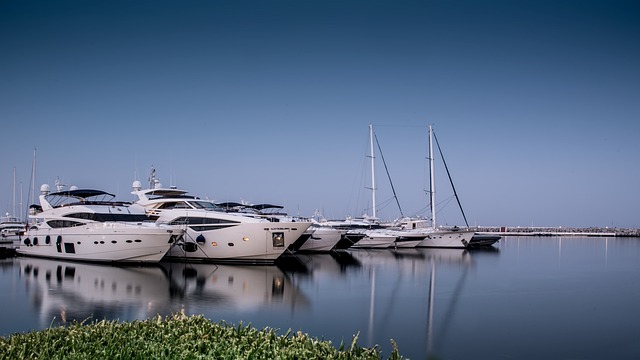Marine operations now face tighter margins, rising costs, and growing pressure to deliver faster, more accurate service. You must maintain marine operations efficiency while reducing fuel use, managing maintenance, and meeting strict maritime compliance best practices. These challenges often pile up when outdated systems and disconnected tools limit how you manage workflows and monitor performance across departments.
A study reported that the global marina management software market is projected to reach $4.30 billion by 2030, growing at a CAGR of 11%. This growth highlights the industry's shift towards digital solutions that streamline operations and improve profitability.
DockMaster, a leading marina management software, offers a comprehensive suite of tools designed to address these challenges. By integrating various aspects of marina operations, from dock management and fuel efficiency to compliance and customer service, DockMaster enables marinas and boatyards to operate more efficiently and profitably.

What is marine operations management?
Marine operations management involves overseeing and coordinating all activities within marinas, boatyards, and waterfront facilities.
It includes several key components, including:
-
Dock management: Organizes slips and dock assignments efficiently to avoid delays and maximize space usage
-
Reservations: Handles transient and long-term bookings to maintain availability and deliver a smooth customer experience
-
Fuel efficiency: Tracks fuel usage accurately and adjust operations to reduce consumption and improve cost control
-
Compliance: Follows maritime regulations strictly to meet standards and avoid legal and financial consequences
-
Asset tracking: Monitors the condition and use of vessels and equipment to maintain performance and avoid breakdowns
-
Customer service: Deliver personalized service that meets expectations and strengthens long-term client satisfaction
DockMaster’s Visual Marina Management gives you an interactive view of your marina with drag-and-drop slip assignments that update instantly. You locate boats on the map in seconds and reassign slips with zero confusion or delay. You manage partially filled slips and linear dockage, including fuel docks, without misallocating space. You also track vessel LOA, LWL, and exact dimensions, so every slip matches the right boat at the right time.
Improve marine operations management efficiency with these 5 proven strategies
Marine businesses handle a wide range of moving parts across financials, service, and operations every single day. When you manage each department on disconnected systems, you waste time switching between tools and chasing updates.
A unified platform like DockMaster connects all areas, so your teams can access accurate information without double-entry or delays. This type of integration lets you control operations from a single source, reducing confusion and helping every department work more efficiently.
Features like robust reporting and customization let you track performance, spot issues early, and respond faster with reliable data. With better reporting, your team make smarter decisions based on accurate insights. That’s why 65% of organizations will be fully data-driven by 2026, and the marine industry is no exception.
Here are several strategies to improve marine operations management efficiency, from the use of data analytics in marine operations to smart marine asset management.
1. Fuel optimization strategies for cost-efficient marine operations
Fuel consumption directly impacts operational costs and environmental sustainability in marine operations. A 2024 study by Opsealog showed that you can reduce fuel consumption by up to 15% through engine optimization and disciplined operational practices.
When you optimize vessel speed and use alternative fuel sources, you also reduce operating costs in a measurable way. You gain tighter control when you use real-time fuel monitoring solutions integrated with DockMaster’s Inventory Management system. These tools let you track exact fuel usage, manage reordering points, and maintain inventory control with precision.
You can set specific minimum and maximum order quantities, access full part specifications, and handle receiving through a clear and structured workflow. The system gives you visibility across parts and fuel consumption, so you can make direct adjustments based on accurate data.
With FuelCloud integration, you access real-time fueling data and gain visibility into internal and external fueling activity. The mobile app and web dashboard support clear fuel tracking, allowing you to make faster, informed decisions throughout each trip.
2. Route planning for marine operations for smarter navigation & cost savings
For marinas, a strategic route planning system translates directly into saving costs. It significantly cuts down fuel wastage and removes unnecessary delays. Techniques such as weather intelligence, real-time monitoring, and AI-based navigation enable enhanced route adjustment according to existing conditions. These tools not only avoid bad weather conditions but also optimize the journey to minimize fuel expenses.
On top of that, DockMaster’s Reservations & Boat Launch Management system gives marinas an efficient way to handle transient reservations. The system integrates seamlessly with billing and payment processing, so you can manage both long-term and short-term bookings with ease. Automated confirmations and notifications keep everyone in the loop.
When it comes to launches, the scheduling system monitors launches in real-time so that everything goes as planned and service teams remain organized. The LaunchMaster integration for dry stack scheduling brings even more convenience. With all this, you can store customer information and vessel details in one place, associating reservations, payments, and insurance without a problem.
3. Data analytics in marine operations for enhancing decision-making
Big data analysis, artificial intelligence, and machine learning process large datasets and extract insights to improve decision-making. You use these technologies to optimize operations and reduce unnecessary costs across multiple areas of your business. Ship owners, for example, use big data analysis to calculate the most fuel-efficient speeds based on schedules, freight rates, and bunker prices. This approach cuts fuel consumption significantly—Maersk reported a 13% reduction after applying data-driven strategies.
DockMaster’s financial management system gives you full control through custom report capabilities tailored to your business needs. You build templates, schedule recurring reports, and export key financial data without depending on external tools. These functions highlight patterns in customer behavior, track financial performance, and expose inefficiencies across departments. You act on these insights to adjust fuel usage, prevent unplanned maintenance, and keep operational costs in check.
The system integrates real-time data, so you can access the latest information before making key operational or financial decisions. You respond faster, cut waste, and push your business toward stronger performance with better clarity and speed.

4. Maritime compliance best practices for ensuring safety & legal adherence
Maritime safety rules protect lives, property, and the environment while ensuring that global trade operations are lawful and secure. You follow these regulations not only for safety but also to maintain complete, accurate records that support compliance. Without proper tracking and reporting, you risk legal issues, heavy penalties, and unnecessary scrutiny from regulatory bodies. Automated compliance tools address this issue and provide accurate records for every transaction, inspection, and operation. You rely on those records to meet regulatory requirements and maintain the integrity of your daily operations.
DockMaster’s Financials & Payment Processing, through its partnership with ValPay, supports that accuracy with a fully integrated system. The solution handles everything from point-of-sale activity to payments for work orders in one secure platform. You process each transaction under strict security standards, which protect your data and reduce the chances of fraud or errors. With next-day funding, you receive money faster and improve your marina’s overall cash flow without relying on outside systems.
DM Pay also lets your customers pay for reservations and estimates using either a credit card or ACH without extra effort. You collect payments faster, make billing easier, and leave customers more satisfied with every completed transaction.
5. Smart marine asset management for reducing maintenance costs
Managing assets properly boosts productivity, cuts downtime, and improves how you allocate resources across your marina. You avoid waste and delays when you track equipment usage and address maintenance needs before they cause problems. Manual processes made that difficult in the past, forcing you to spend extra time without gaining full visibility. The Internet of Things (IoT) changes that by giving you faster, data-driven ways to monitor and maintain every asset you manage.
In fact, the marine IoT market is projected to grow to $6,950.66 million by 203, reflecting a CAGR of 14.52%. You can now use automated maintenance schedules to protect equipment, extend asset life, and avoid expensive failures. Timely upkeep prevents breakdowns and keeps dock operations moving without last-minute disruptions or unplanned service calls. Predictive maintenance takes it a step further and uses IoT data to detect problems before they turn into major costs.
DockMaster’s Service & Repair Management system helps you apply these practices with tools built for real-time asset tracking. You generate work orders from estimates, assign labor, and build complete service histories that you can access anytime. It also integrates with PartSmart from ARI, giving you accurate control over inventory and part availability. The system tracks labor and materials with precision, so you avoid billing mistakes and protect profit margins.
Challenges in marine operations optimization & how to overcome them
Marine operations face numerous challenges that can affect profitability and operational efficiency. Here’s a breakdown of these challenges:
-
Rising fuel costs: Fuel remains one of the highest maritime expenses, and price volatility keeps tightening your margins. You must find smarter ways to control consumption and reduce waste without compromising performance
-
Regulatory complexities: You face constantly changing maritime regulations that vary across regions and vessel types. Keeping up with them requires dedicated tools, especially when manual tracking increases the risk of costly errors
-
Outdated technologies: Many operators still use legacy systems that slow down tasks, introduce errors, and increase operating costs. These outdated tools prevent you from acting quickly or scaling efficiently as your business grows
You overcome these issues by adopting smart technologies that automate tasks and help you reduce fuel costs and regulatory risks. Digital systems give you faster access to accurate data, which lets you cut manual work and improve results.
DockMaster brings over 40 years of industry experience and delivers a flexible platform that adapts to the demands of modern marine operations. You handle everything from compliance to reporting and fuel management without switching systems or losing control.
As your business expands, DockMaster grows with you and supports real-time insights, process accuracy, and operational consistency across every location.
The future of marine operations management: Key trends to watch out for
As the marine software industry evolves, new technologies reshape how you manage operations, make decisions, and increase efficiency. AI-driven automation reduces manual effort, cloud-based software centralizes access, and real-time data improves the speed of your responses. These tools give you control over logistics, improve accuracy, and support faster, smarter decisions at every level.
To stay competitive, you need advanced systems like DockMaster that consolidate operations and eliminate unnecessary manual processes. You use the platform to track bookings, manage transactions, and access clear insights that drive daily performance. The system also improves how you serve customers and helps you react quickly as the industry continues to change.
Ready to navigate the future of marine management operations with confidence? Contact us today and transform your marina into a data-driven powerhouse.
FAQs
1. What is marine operations management?
Marine operations management involves overseeing the activities of marinas and boatyards, including dock management, reservations, fuel efficiency, compliance, asset tracking, and customer service.
2. What are the best fuel optimization strategies for marine operations?
Speed control, alternative fuel usage, and real-time fuel monitoring help you cut waste and protect operating margins. Each method supports better fuel decisions, reduces unnecessary consumption, and contributes directly to long-term cost control.
3. What are maritime compliance best practices?
Meeting regulations, maintaining accurate records, and using management systems form the basics of effective maritime compliance. These actions reduce legal risks, simplify audits, and help you stay consistent across regions and vessel types.
4. How can marine asset management reduce costs?
Implementing IoT-based monitoring and proactive maintenance scheduling can reduce operational downtime and extend the lifespan of vessels and equipment, leading to cost savings.
5. Why is sustainability important in marine operations?
Sustainability plays a crucial role in protecting the environment, maintaining regulatory compliance, and cutting costs through efficient resource management.
